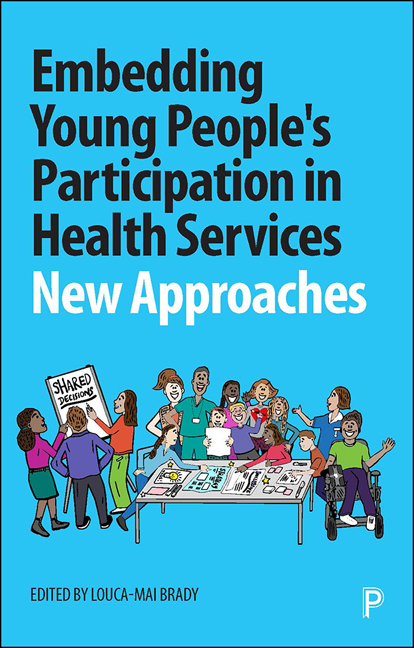Book contents
- Frontmatter
- Dedication
- Contents
- List of Boxes, Figures and Tables
- Summary
- Notes on Contributors
- Acknowledgements
- Foreword
- Introduction: Embedding Young People’s Participation in Healthcare
- PART I Young People’s Participation in Individual Decision-Making
- PART II Participation in National Projects and Programmes
- PART III Collaborative Research in NHS Services
- PART IV Young People-led Participation
- Index
5 - Innovative Ways of Engaging Young People Whose Voices Are Less Heard
Published online by Cambridge University Press: 25 February 2021
- Frontmatter
- Dedication
- Contents
- List of Boxes, Figures and Tables
- Summary
- Notes on Contributors
- Acknowledgements
- Foreword
- Introduction: Embedding Young People’s Participation in Healthcare
- PART I Young People’s Participation in Individual Decision-Making
- PART II Participation in National Projects and Programmes
- PART III Collaborative Research in NHS Services
- PART IV Young People-led Participation
- Index
Summary
Introduction
The Association for Young People's Health (AYPH) is the UK's leading independent voice for youth health. We work to improve the health and wellbeing of 10–24-year-olds by improving understanding of young people's health needs and promoting youth-friendly health services. We do this through influencing policy and practice, producing evidence-based reports and briefings (such as our biennial Key Data on Young People publications), and running projects to test new models of health care delivery for this age group. Involving young people in all our activities is essential for us, and much of our work focuses on ensuring their voices are heard. AYPH has a particular mission to ensure that opportunities to engage in the development of health services are extended to young people who may be more marginalised from the mainstream, and who may find it harder to get their voices heard.
In this chapter we draw on three projects we have undertaken recently, each presenting rather different challenges to participation. The first was a project to get young people's views on acute care, the second related to young people who had been affected by sexual exploitation and the third was on obesity. Each presented different challenges relating to the particular topic of the study and the method of engagement, but there were also common lessons to be learned about how to engage more marginalised young people and how to draw on creative approaches to amplify their voices in ways that do not threaten their need for confidentiality. Two case studies from young people involved in participation projects illustrate some of these issues and their solutions.
Background
Every young person has a right to be heard. For those up to 18 this is enshrined in the UN Convention on the Rights of the Child (United Nations General Assembly, 1989). For those who are young adults the right may not be so clearly articulated in international protocols, but they have as much right as anyone else. This sounds obvious but is not always well articulated. In the UK, young people's participation in political and social dialogue is low (Electoral Commission, 2002; British Youth Council, 2015).
- Type
- Chapter
- Information
- Embedding Young People's Participation in Health ServicesNew Approaches, pp. 131 - 154Publisher: Bristol University PressPrint publication year: 2020



